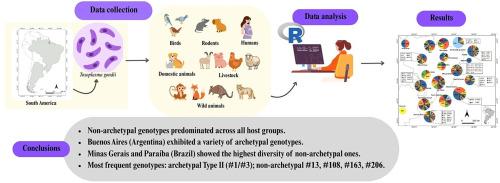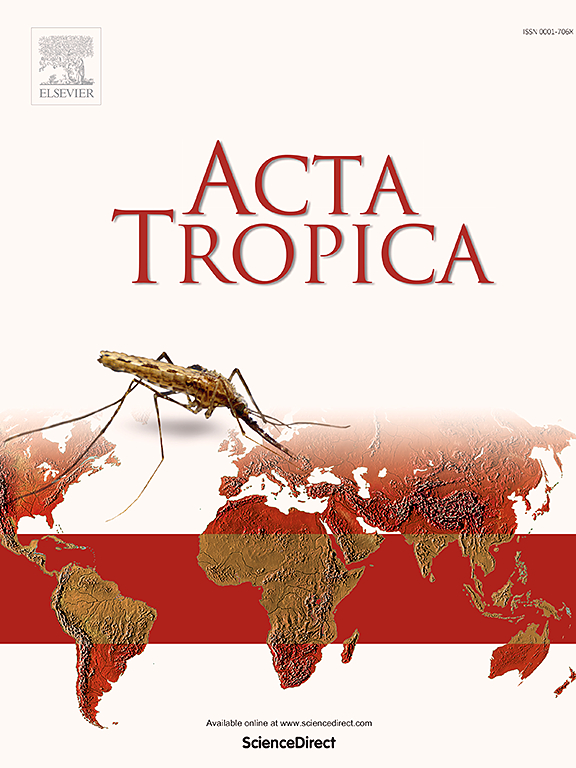Predominance of non-archetypal Toxoplasma gondii genotypes in Brazil and Argentina: Evidence from a systematic review and meta-analysis
IF 2.5
3区 医学
Q2 PARASITOLOGY
引用次数: 0
Abstract
Toxoplasma gondii is a zoonotic protozoan of global concern, capable of infecting all warm-blooded animals, with important implications for both public health and food safety. In South America, this parasite exhibits high genetic diversity. This study included systematically reviewed and meta-analysed genotyping data reported between 2013 and 2023, using the multiplex nested PCR-restriction fragment length polymorphisms technique. Forty-five studies were included (nBrazil = 42; nArgentina = 3) and hosts were categorized as birds, rodents, humans, domestic and wild animals and livestock. Among the 480 DNA samples analysed, genotypes were successfully obtained from 421, of which 22 (5.2 %) were archetypal and 399 (94.8 %) non-archetypal. Meta-analysis of proportions revealed a pooled prevalence of 0.44 (CI95%: 0.20–0.72) for archetypal genotypes and 0.98 (CI95%: 0.95–0.99) for non-archetypal ones. Non-archetypal genotypes predominated across all host groups. Among the most frequently reported genotypes, the following stood out: in the archetypal, Type II (#1/#3) and in the non-archetypal, #13, #108, #163 and #206. Buenos Aires (Argentina) exhibited a variety of archetypal genotypes, while Minas Gerais and Paraíba (Brazil) showed the highest diversity of non-archetypal ones. This is the first meta-analysis specifically addressing the molecular diversity of T. gondii genotypes reported in South America over the last decade. By consolidating regional evidence, it provides an updated overview of circulating genotypes and highlights critical knowledge gaps. Using pooled genotype proportions across host groups and countries, pattern synthesis and bias diagnostics (heterogeneity, subgroup analysis, funnel plots), it is demonstrated that the evidence is uneven and method-dependent, limiting inference on transmission routes; this reaffirms the need for strengthened, standardized molecular surveillance in South America.

非原型弓形虫基因型在巴西和阿根廷的优势:来自系统回顾和荟萃分析的证据。
刚地弓形虫是一种全球关注的人畜共患原虫,能够感染所有温血动物,对公共卫生和食品安全具有重要影响。在南美洲,这种寄生虫表现出高度的遗传多样性。本研究采用多重嵌套pcr -限制性片段长度多态性技术,系统回顾和荟萃分析了2013年至2023年间报告的基因分型数据。纳入45项研究(巴西 = 42;阿根廷 = 3),宿主分类为鸟类、啮齿动物、人类、家畜和野生动物及牲畜。在分析的480份DNA样本中,成功获得421份基因型,其中22份(5.2%)为原型型,399份(94.8%)为非原型型。比例荟萃分析显示,原型基因型的总患病率为0.44 (CI95%: 0.20-0.72),非原型基因型的总患病率为0.98 (CI95%: 0.95-0.99)。非原型基因型在所有宿主群体中占主导地位。在最常报道的基因型中,以下是突出的:在原型中,II型(#1/#3),在非原型中,#13,#108,#163和#206。阿根廷的布宜诺斯艾利斯具有多种原型基因型,而巴西的米纳斯吉拉斯州和Paraíba具有最高的非原型基因型多样性。这是第一个专门针对过去十年在南美洲报道的弓形虫基因型分子多样性的荟萃分析。通过整合区域证据,它提供了流行基因型的最新概况,并突出了关键的知识差距。通过综合宿主群体和国家的基因型比例、模式综合和偏倚诊断(异质性、亚组分析、漏斗图),证明证据不均匀且依赖于方法,限制了对传播途径的推断;这重申了在南美洲加强标准化分子监测的必要性。
本文章由计算机程序翻译,如有差异,请以英文原文为准。
求助全文
约1分钟内获得全文
求助全文
来源期刊

Acta tropica
医学-寄生虫学
CiteScore
5.40
自引率
11.10%
发文量
383
审稿时长
37 days
期刊介绍:
Acta Tropica, is an international journal on infectious diseases that covers public health sciences and biomedical research with particular emphasis on topics relevant to human and animal health in the tropics and the subtropics.
 求助内容:
求助内容: 应助结果提醒方式:
应助结果提醒方式:


